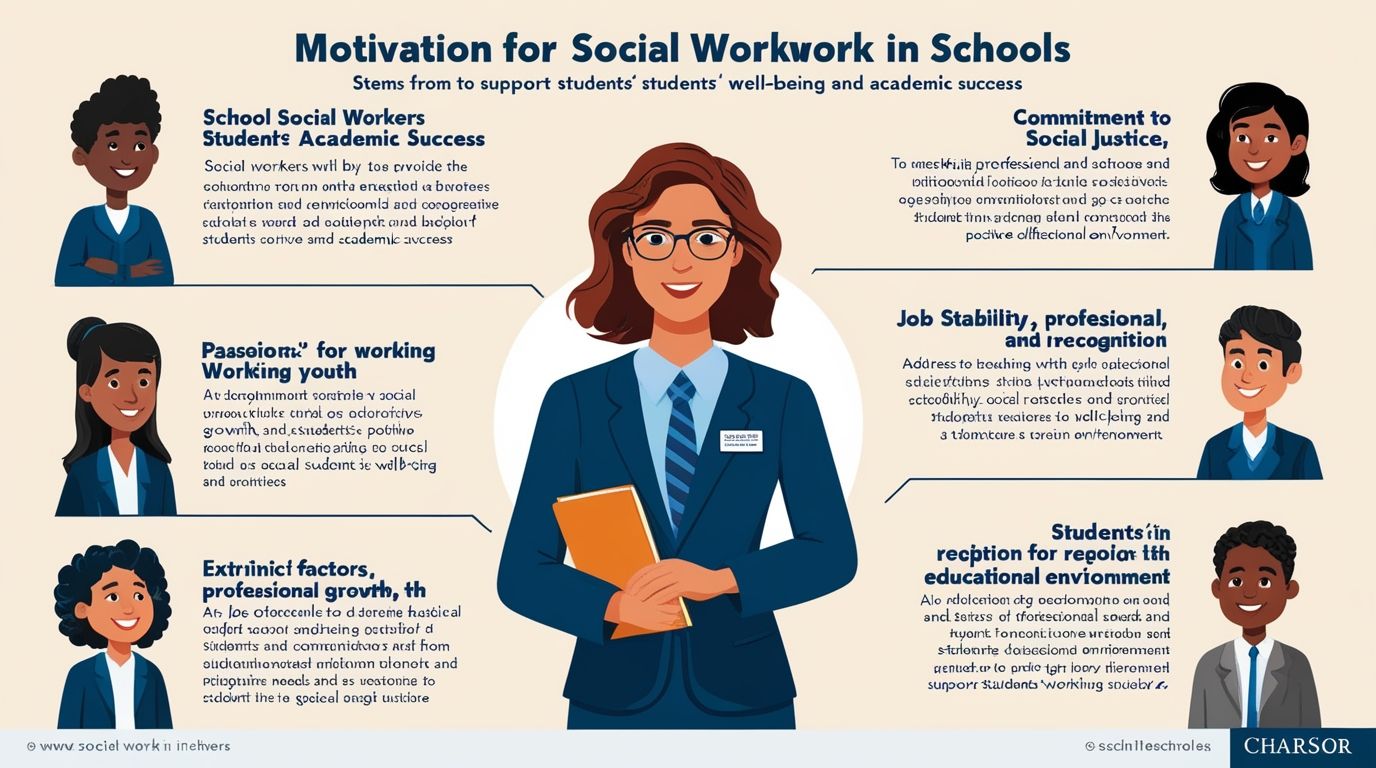Introduction
Motivation for Social Work in Schools Social work in schools is a vital field that bridges the gap between educational institutions and the broader community. School social workers play a crucial role in addressing the social, emotional, and behavioral needs of students, thereby enhancing their academic performance and overall well-being. Understanding the motivation behind social work in schools is essential to appreciate the depth of commitment and the impact these professionals have on students’ lives. This article explores the motivations for pursuing social work in schools, examining both the intrinsic and extrinsic factors that drive individuals to this profession.
The Role of Social Workers in Schools
School social workers serve as liaisons between students, families, schools, and communities. Their primary goal is to ensure that students have the necessary support to succeed academically and socially. They address issues such as mental health, family dynamics, substance abuse, and absenteeism, working closely with teachers, administrators, and parents to develop and implement interventions.
The responsibilities of school social workers are diverse and can include individual and group counseling, crisis intervention, developing and implementing prevention programs, advocating for students’ rights, and connecting families with community resources. This multifaceted role requires a deep understanding of child development, family systems, and educational environments.

Intrinsic Motivation for School Social Work
1. Desire to Make a Difference
A significant intrinsic motivator for individuals pursuing social work in schools is the desire to make a positive difference in students’ lives. Many social workers are driven by a commitment to social justice and equity, aiming to support vulnerable populations and address the barriers to education that many students face. The fulfillment that comes from helping students overcome challenges and achieve their potential is a powerful motivator.
2. Passion for Working with Youth
Another intrinsic motivator is a passion for working with children and adolescents. School social workers often have a deep interest in child and adolescent development and motivated by the opportunity to work directly with young people. This passion often rooted in a genuine concern for the well-being of students and a desire to support their growth and development during critical stages of their lives.
3. Personal Experiences and Background
Personal experiences, such as overcoming adversity during childhood or having positive interactions with a school social worker, can also inspire individuals to pursue a career in school social work. These experiences often foster a strong empathy for students facing similar challenges and a desire to provide the support that either received or lacked during their own school years.
4. Commitment to Social Justice
Many social workers driven by a strong commitment to social justice. They motivated by the belief that all students, regardless of their background or circumstances, deserve equal access to education and the opportunity to succeed. This commitment often leads social workers to advocate for systemic changes within schools and communities, aiming to address inequalities and promote a more inclusive educational environment.
Extrinsic Motivation for School Social Work
1. Professional Opportunities and Stability
Extrinsic motivators, such as job stability and professional opportunities, also play a role in motivating individuals to pursue social work in schools. The demand for school social workers is growing, driven by an increasing awareness of the importance of addressing students’ social and emotional needs. This demand provides a sense of job security and opportunities for career advancement, which can be appealing to those entering the field.
2. Financial Compensation
While social work often considered a calling rather than a lucrative career, financial compensation can still be a motivating factor. In some regions, school social workers compensated relatively well compared to other social work roles, particularly in public school systems with strong unions. The prospect of a stable income and benefits can be a significant extrinsic motivator.
3. Professional Recognition and Status
The recognition and status associated with being a school social worker can also be motivating. These professionals are often seen as essential members of the educational team, contributing to the overall success of the school and its students. This recognition can provide a sense of pride and accomplishment, further motivating individuals in their work.
4. Opportunities for Continued Learning and Development
The field of school social work offers numerous opportunities for continued learning and professional development. Social workers in schools often engage in ongoing education and training to stay current with best practices, new interventions, and emerging issues in the field. This continuous growth and development can be a motivating factor for those who value lifelong learning and professional advancement.

The Impact of Motivation on Social Work Practice
The motivations that drive individuals to pursue social work in schools have a profound impact on their practice. Intrinsic motivators, such as a desire to make a difference and a passion for working with youth, often lead to a deep commitment to students and a willingness to go above and beyond in their work. These social workers are likely to be highly engaged, empathetic, and persistent in advocating for their students.
On the other hand, extrinsic motivators, such as job stability and financial compensation, can also positively influence practice by providing a sense of security and satisfaction. When social workers feel valued and supported in their roles, they are more likely to be motivated to excel in their work. The combination of intrinsic and extrinsic motivators can lead to a well-rounded and highly effective social work practice in schools.
Challenges and Barriers to Motivation
Despite the many motivations for pursuing social work in schools, there are also challenges and barriers that can impact motivation. High caseloads, limited resources, and bureaucratic constraints can lead to burnout and frustration, particularly for those driven by intrinsic motivators. The emotional toll of working with vulnerable populations can also be significant, leading to compassion fatigue and decreased motivation over time.
Additionally, extrinsic motivators such as financial compensation and job stability may not always be sufficient to sustain motivation in the face of these challenges. Social workers may find themselves struggling to maintain their commitment and passion for the work, particularly when faced with systemic issues that are difficult to change.
Strategies for Sustaining Motivation
To sustain motivation in school social work, it is essential to address both intrinsic and extrinsic factors. For intrinsic motivation, social workers can benefit from self-care practices, professional support networks, and opportunities for reflection and renewal. Regular supervision and peer support can provide a space to process difficult cases and prevent burnout.
For extrinsic motivation, advocating for better working conditions, fair compensation, and access to professional development opportunities can help sustain motivation over the long term. School administrators and policymakers can play a crucial role in supporting social workers by recognizing their contributions and providing the resources needed to do their jobs effectively.
Conclusion
Motivation for social work in schools is driven by a complex interplay of intrinsic and extrinsic factors. The desire to make a difference, a passion for working with youth, and a commitment to social justice are powerful intrinsic motivators, while job stability, financial compensation, and professional recognition provide important extrinsic incentives. Understanding these motivations is key to supporting and sustaining the work of school social workers, ensuring they can continue to provide essential services to students and contribute to the overall success of educational institutions.
Addressing the challenges and barriers to motivation is also crucial in maintaining a motivated and effective workforce. By fostering both intrinsic and extrinsic motivators, the field of school social work can continue to attract and retain dedicated professionals who are committed to making a positive impact on the lives of students.

10 thoughts on “Motivation for Social Work in Schools”
Comments are closed.